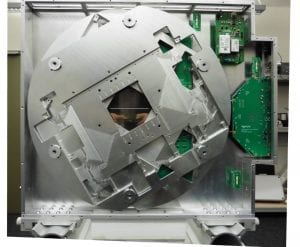An exhibit detailing the University of Lincoln’s revolutionary research into cancer treatment will be one of many exciting and thought-provoking attractions as Spark Engineering Festival returns to Lincoln.
The University of Lincoln is working with City of Lincoln Council, Lincoln University Technical College, Lincoln College and a range of the region’s engineering firms to provide opportunities for people to learn about the city’s cutting-edge engineering and manufacturing sector; and to inspire the next generation to consider a career in the industry.
A three-day celebration of the city’s engineering past, present and future, the Spark Engineering Festival is free and will run from Friday, 17th April until Sunday, 19th April 2015.
The University’s input will focus on current engineering research projects, detailing the Lincoln School of Engineering’s work on power generation, systems control, automotive dynamics and manufacturing technologies for the food industry. The displays will highlight how this ongoing research impacts on the city and wider society.
Professor Nigel Allinson, MBE, from the School of Computer Science, will be showcasing the PRaVDA consortium’s revolutionary work into cancer treatment revealing the new technology they are developing for the treatment of cancer using proton therapy. PRaVDA (Proton Radiotherapy Verification and Dosimetry Applications) – one of the most complex medical instruments ever conceived – will let clinicians see in 3D how the protons interact with a tumour. Proton therapy has the ability to deliver high doses of radiation directly to a tumour site with little radiation being absorbed into healthy tissue.
PRaVDA is supported by a multi-million pound grant from The Wellcome Trust, and Lincoln-led consortium consists of six universities, four NHS Trusts and South Africa’s National Research Laboratories.
Dr Colin Dowding, Senior Lecturer in the School of Engineering at the University of Lincoln, has also created a number of hands-on activities that will show young people the fundamental physical relationships that affect our everyday lives.
Dr Dowding said: “The Spark Engineering Festival has been developed to showcase the engineering expertise in Lincolnshire and to inspire the next generation to pursue a career in the engineering sector, contributing to finding solutions to many of the challenges we face as a society.
“The engineering courses offered by the University of Lincoln are unique in that the electrical and mechanical disciplines are not segregated. Graduates achieve a distinct degree qualification with emphasis on their chosen discipline but each student is constantly exposed to key elements of the alternate discipline. In this way Lincoln graduates are grounded in the core engineering sciences, ensuring that they are prepared for the modern team-based approach to problem solving. The School of Engineering offers a wide breadth of expertise and the University continues to build an academic community to help inform industry and develop new avenues of research.”
Alongside a giant pendulum hanging from the cathedral roof, other displays will include racing cars, a steam engine, model tank and 3D printing.
Aspiring engineers can take part in a Scaletrix challenge, build wind turbines using K’Nex and test propellers in a wind tunnel.
And be sure to see the engineering timeline – a 50ft long display of the history of engineering, how it has impacted the world and how Lincoln has played a vital part in its heritage.
From Formula One cars to jumbo jets, products made in Lincoln and Lincolnshire are used in planes, trains and automobiles around the world, with companies including Siemens, Dynex and Micrometric choosing to base their operations in the city.
Admission to the festival is free.
